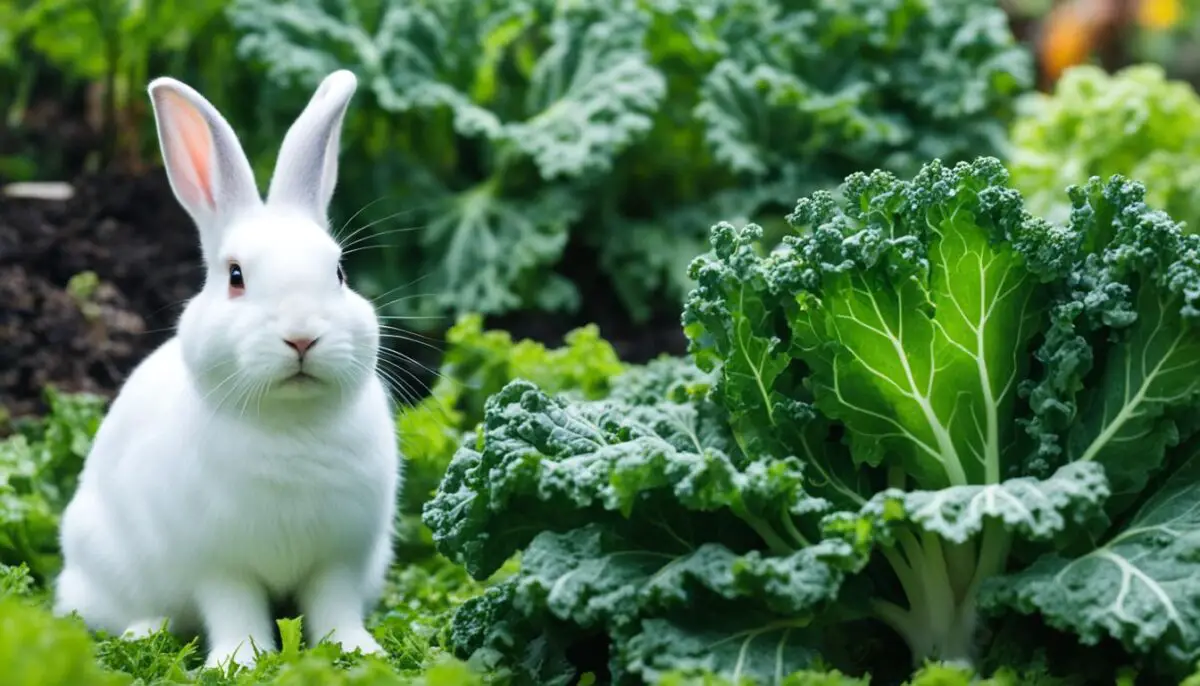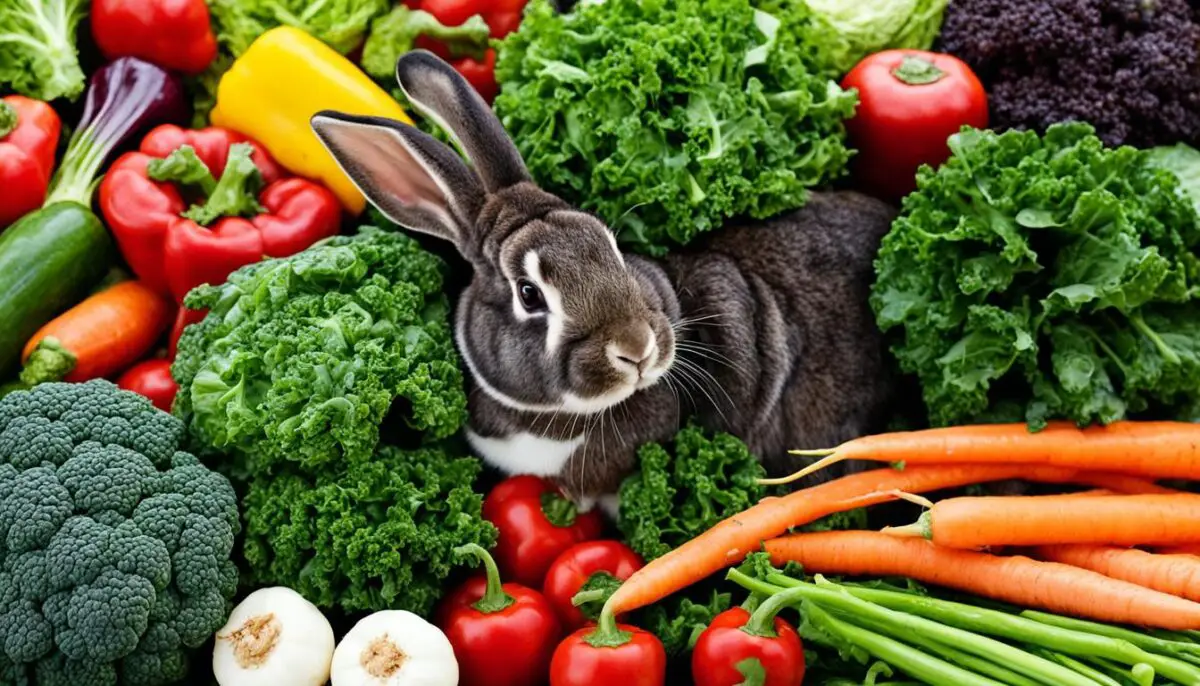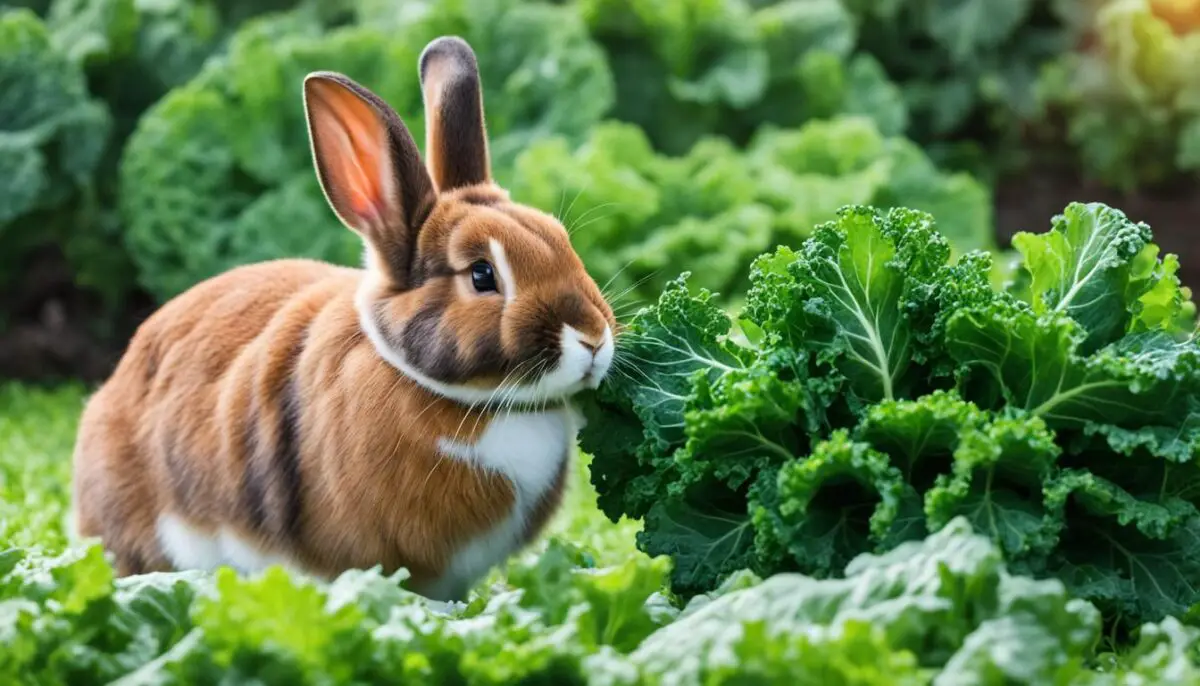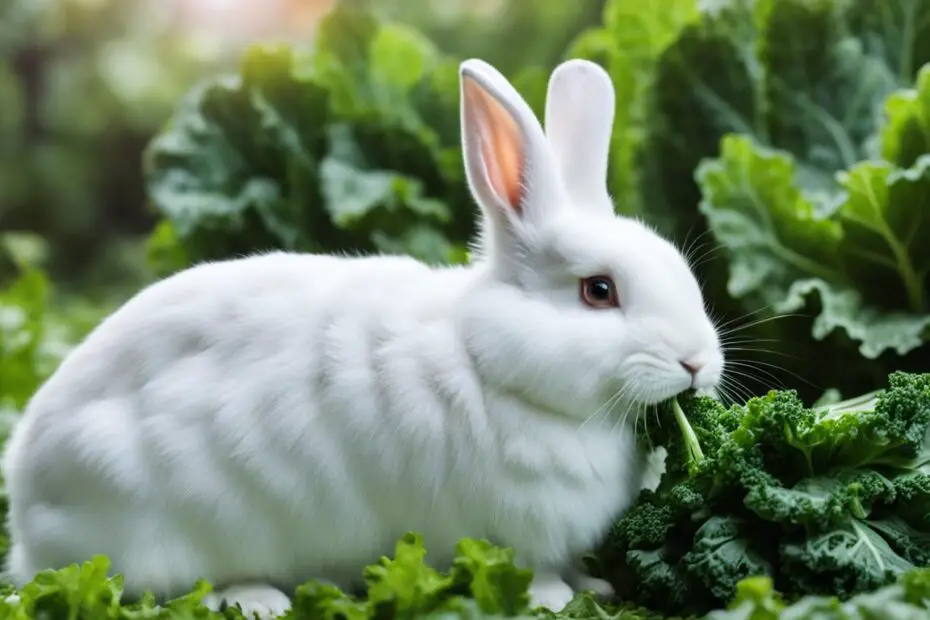When it comes to a rabbit’s diet, it’s important to provide them with the right balance of nutrients to support their overall health and well-being. Rabbits are herbivores, which means their diet should consist mainly of plant-based foods. But can rabbits have kale?
Kale is a popular leafy green vegetable that is packed with nutrients and is often included in human diets. But is it safe for rabbits to eat? Let’s explore the topic of feeding rabbits kale and uncover the safe feeding tips you need to know.
Key Takeaways:
- Rabbits are herbivores and require a diet that is high in fiber
- The main part of a rabbit’s diet should be hay or dried/fresh grass
- Kale can be safely included in a rabbit’s diet in moderation
- It is important to wash and cut kale properly before offering it to your rabbit
- Consult with a veterinarian or qualified pet care specialist for any concerns or questions
The Importance of a Suitable Diet for Rabbits
A suitable diet is essential for the overall health and well-being of rabbits. It plays a crucial role in maintaining their dental health, promoting regular digestion, and preventing boredom. To ensure that rabbits receive the necessary nutrition, their diet should consist of a variety of food options.
The main component of a rabbit’s diet should be large quantities of hay or dried/fresh grass. This provides them with the necessary fiber, which is vital for their digestive system. Hay helps to maintain the health of their teeth by wearing them down naturally. It also encourages regular bowel movements and prevents gastrointestinal issues.
In addition to hay, leafy greens should be included in a rabbit’s diet. These greens are rich in vitamins and minerals that support overall rabbit nutrition. Some examples of safe leafy greens include spinach, romaine lettuce, and cilantro. These greens should be introduced gradually and fed in moderation.
Rabbits also require a small amount of high-quality rabbit food as part of a balanced diet. Rabbit food typically contains essential nutrients, such as vitamins and minerals, that support their overall health. It is important to choose a reputable brand and provide the recommended serving size to avoid overfeeding.
It is crucial to avoid selective feeding, where rabbits only consume their favorite foods. This can lead to nutrient imbalances and deficiencies. By providing a diverse range of foods, rabbits will receive a balanced diet that meets their nutritional needs.
When introducing any changes to a rabbit’s diet, it is important to do so gradually. Sudden changes can cause digestive upset and other health issues. Slowly incorporate new foods and observe how the rabbit responds to them. If there are any signs of digestive issues or abnormalities, it is recommended to consult a veterinarian.
Overall, a suitable diet is vital for the health and happiness of rabbits. It is essential to provide them with a diet that includes hay, leafy greens, and high-quality rabbit food to ensure their nutritional needs are met. By maintaining a balanced diet, rabbits can lead a healthy and fulfilling life.
| Nutritional Components | Importance |
|---|---|
| Fiber | Aids digestion and maintains dental health |
| Vitamins and Minerals | Support overall health and well-being |
| Leafy Greens | Provide essential nutrients and variety |
| Rabbit Food | Supplements diet with necessary nutrients |
| Diverse Diet | Prevents nutrient imbalances and deficiencies |
| Gradual Changes | Prevents digestive upset and health issues |

Nutritional Benefits of Kale for Rabbits
Kale offers several nutritional benefits for rabbits due to its rich nutrient profile. It contains vitamins such as vitamin A, which promotes good eye health, and vitamin K, which helps with blood clotting. Kale also provides minerals like iron, which aids in the production of healthy red blood cells, and calcium, which supports strong bones and teeth. Additionally, kale is a source of dietary fiber, which aids in proper digestion.
| Nutrient | Amount per 100g of Kale |
|---|---|
| Vitamin A | 4816 IU |
| Vitamin K | 389μg |
| Iron | 1.47mg |
| Calcium | 150mg |
Despite the nutritional benefits, it is important to remember that kale should be fed in moderation as part of a balanced diet. The serving size should be appropriate for your rabbit’s size and weight. Always introduce new foods gradually and observe your rabbit’s response. If any digestive issues or abnormalities occur, it is best to consult a veterinarian.
Remember, there are also other safe leafy greens that can complement a rabbit’s diet, providing additional nutrition and variety. It is always recommended to offer a balanced mix of vegetables, such as broccoli, cabbage, parsley, watercress, and celery leaves, alongside the staple diet of hay or grass.
Feeding Tips for Kale and Rabbits
When it comes to feeding kale to rabbits, there are a few important tips to keep in mind to ensure their safety and well-being.
- Wash and Prepare Properly: Before offering kale to your rabbits, make sure to wash it thoroughly to remove any dirt or contaminants. It is also essential to cut kale into small, bite-sized pieces to prevent choking and facilitate digestion.
- Offer in Moderation: While kale can be a nutritious addition to a rabbit’s diet, it should be fed in moderation. A suitable serving size would be approximately two large leaves or three smaller ones per serving.
- Avoid Overfeeding: Rabbits should not consume kale more than 2-3 times a week to prevent overfeeding. Excessive consumption of kale or any other food can lead to digestive issues and other health problems.
- Choose Organic Options: To ensure the kale is safe for your rabbits, opt for organic varieties that are free from chemicals or pesticides. This helps protect their health and minimizes the risk of exposure to harmful substances.
If you notice any digestive issues or abnormalities after introducing kale into your rabbit’s diet, it is advisable to consult a veterinarian for further guidance and support.

The Importance of Proper Feeding
Feeding rabbits a balanced diet is crucial for their overall health and well-being. While kale can be a part of their diet, it is essential to ensure proper portion control and variety to meet their nutritional needs. Remember to introduce any diet changes gradually and monitor your rabbit’s response to ensure optimal health and happiness.
Nutritional Benefits of Kale for Rabbits
Kale is a nutrient-dense vegetable that offers numerous health benefits for rabbits. It is packed with essential vitamins, minerals, and antioxidants that contribute to your rabbit’s overall well-being and optimal nutrition.
Here are some of the key nutrients found in kale:
- Vitamin A: Promotes healthy eyesight and immune function.
- Vitamin K: Supports blood clotting and bone health.
- Iron: Essential for the production of red blood cells.
- Calcium: Contributes to strong bones and teeth.
- Fiber: Aids in proper digestion and prevents gastrointestinal issues.
- Protein: Helps build and repair body tissues.
By incorporating kale into your rabbit’s diet, you can provide them with these vital nutrients that ensure their overall health and vitality. However, it’s crucial to remember that kale should be fed in moderation as part of a balanced diet to prevent any potential nutrient imbalances or digestive problems.
Here’s an enticing visual representation of kale’s nutritional content:
| Nutrient | Amount per 100g of Kale |
|---|---|
| Vitamin A | 5126 IU |
| Vitamin K | 704.8 mcg |
| Iron | 1.47 mg |
| Calcium | 150 mg |
| Fiber | 2 g |
| Protein | 4.3 g |
Remember to always monitor your rabbit’s dietary intake and consult with a veterinarian or qualified pet care specialist for personalized advice and guidance.

Other Safe Foods for Rabbits
In addition to kale, there are a variety of other safe vegetables that can be included in a rabbit’s diet. These vegetables provide essential nutrients and help diversify their meals. Here are some examples:
- Broccoli: Rich in vitamin C, broccoli is a nutritious vegetable that can be fed to rabbits in small quantities. It is important to remove any tough stems and offer only the florets.
- Cabbage: Cabbage is another safe vegetable for rabbits, but it should be given sparingly. Too much cabbage can cause gastrointestinal upsets, so it’s best to offer small portions occasionally.
- Parsley: Parsley is a leafy herb that can be a tasty addition to a rabbit’s diet. It is high in vitamin C and should be given in moderation due to its calcium content.
- Watercress: Watercress is a nutrient-dense leafy green that rabbits can enjoy. It is low in calories and high in vitamins and minerals, making it a healthy choice.
- Celery Leaves: The leaves of celery can be a safe and tasty treat for rabbits. They are a good source of fiber and can help with digestion.
- Other Leafy Greens: Spinach, romaine lettuce, and arugula are among the other leafy greens that rabbits can eat. These greens should be offered in moderation to avoid any digestive issues.
When introducing these vegetables to your rabbit’s diet, it is important to wash and dry them thoroughly to remove any dirt or pesticides. Additionally, it’s essential to provide a balanced diet that includes a variety of vegetables, hay, and high-quality rabbit food. Remember to introduce new foods gradually and monitor your rabbit’s response to ensure their well-being.
Safe Vegetables for Rabbits
| Vegetable | Nutritional Benefits | Feeding Guidelines |
|---|---|---|
| Broccoli | Rich in vitamin C | Offer small portions occasionally Remove tough stems and offer florets |
| Cabbage | Contains essential nutrients | Give sparingly Avoid feeding large amounts |
| Parsley | High in vitamin C | Offer in moderation due to calcium content |
| Watercress | Low in calories, rich in vitamins and minerals | Feed as part of a varied diet |
| Celery Leaves | Source of fiber, aids in digestion | Feed as a tasty treat |
| Other Leafy Greens | Varying nutritional profiles | Offer in moderation Avoid overfeeding |
Conclusion
Overall, kale can be safely included in a rabbit’s diet as part of a balanced nutrition plan. Kale is a nutrient-dense vegetable that provides several health benefits to rabbits. It is rich in vitamins, minerals, and antioxidants that support their immune system and overall well-being.
However, it is important to feed kale to rabbits in moderation. Any changes to their diet should be introduced gradually to prevent digestive issues. To ensure the safety of your rabbit, always wash and cut kale properly before offering it. It is also recommended to consult with a veterinarian or qualified pet care specialist if any concerns or questions arise.
Providing rabbits with a suitable diet is crucial for their overall health. In addition to kale, other safe vegetables like broccoli, cabbage, parsley, and leafy greens can be included in their diet. Remember, a balanced diet that includes hay or dried/fresh grass as the main component, along with appropriate portions of leafy greens and high-quality rabbit food, is essential for their well-being.
FAQ
Can rabbits have kale?
Yes, rabbits can eat kale. Kale is a safe leafy green that can be included in a rabbit’s diet. However, it should be fed in small quantities and not exceed the recommended serving size.
Why is a suitable diet important for rabbits?
A suitable diet is essential for rabbits as it helps maintain their dental health, regular digestion, and prevents boredom. Rabbits should have large quantities of hay or dried/fresh grass as the main component of their daily diet.
How often can rabbits eat kale?
Rabbits can safely eat kale 2-3 times a week. It is important to introduce kale gradually into a rabbit’s diet and monitor for any signs of digestive issues.
What are the nutritional benefits of kale for rabbits?
Kale is a nutrient-dense vegetable that is rich in vitamins, minerals, and antioxidants. It provides essential nutrients such as protein, fiber, vitamin A, vitamin K, iron, and calcium, supporting a rabbit’s immune system and overall health.
What other safe foods can be included in a rabbit’s diet?
Other safe vegetables for rabbits include broccoli, cabbage, parsley, watercress, celery leaves, and other leafy greens. It is important to wash and dry all green foods before offering them to rabbits.
How should kale be prepared and served to rabbits?
Kale should be washed properly and cut into small, bite-sized pieces to prevent choking. A small amount of kale, such as two large leaves or three smaller ones, can be offered per serving.
Is it necessary to consult a veterinarian before introducing kale to a rabbit’s diet?
While it is not always necessary, consulting a veterinarian before making any significant changes to a rabbit’s diet is recommended, especially if there are concerns or questions. A veterinarian can provide personalized advice based on the rabbit’s specific needs.
Is it safe to feed wild plants to rabbits?
While some wild plants, such as chickweed, raspberry leaves, and dandelion, can be safe for rabbits if properly identified, it is crucial to avoid feeding any plant that may be poisonous to rabbits. It is best to consult a veterinarian or qualified pet care specialist for guidance.


